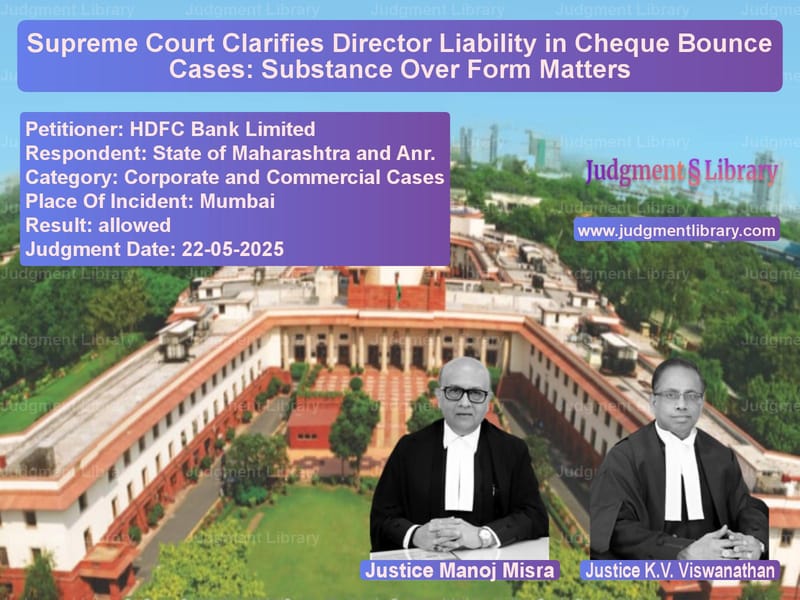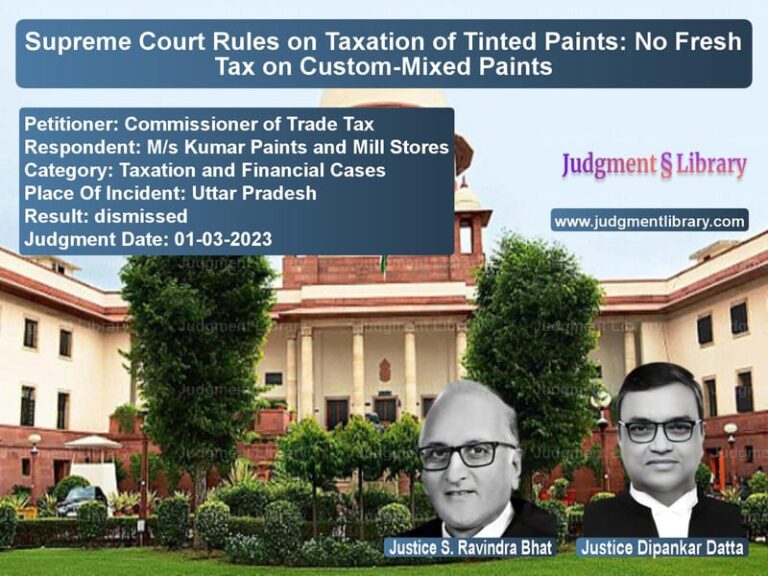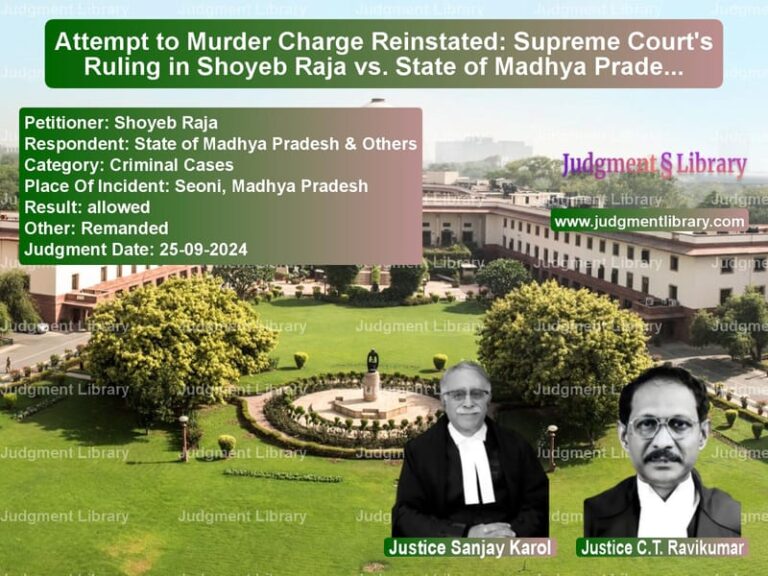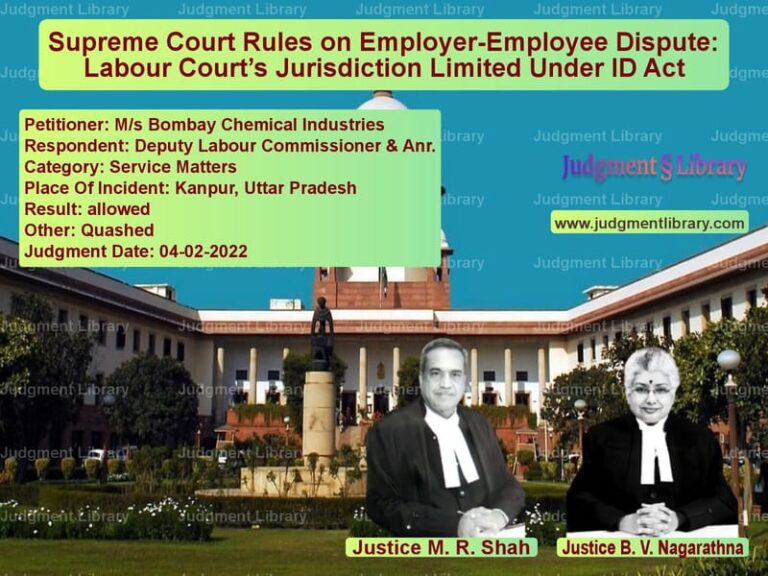Supreme Court Clarifies Director Liability in Cheque Bounce Cases: Substance Over Form Matters
In a significant ruling that clarifies the legal requirements for prosecuting company directors in cheque bounce cases, the Supreme Court of India has reinstated criminal proceedings against a director of a company, emphasizing that substance matters more than form when it comes to legal pleadings. The judgment, delivered on May 22, 2025, overturns the Bombay High Court’s decision that had quashed proceedings against Mrs. Ranjana Sharma, a director of M/s R Square Shri Sai Baba Abhikaran Pvt. Ltd., in a case involving a dishonored cheque worth Rs. 6.02 crores.
The case originated when HDFC Bank Limited filed a complaint under Section 138 of the Negotiable Instruments Act, 1881, after a cheque issued by the company was dishonored with the reason “account blocked.” The bank had extended credit facilities to the company, which eventually became a Non-Performing Asset. The complaint named the company and three directors, including Mrs. Ranjana Sharma, as accused.
The Legal Battle
The core legal issue revolved around whether the complaint contained sufficient averments to invoke vicarious liability against Mrs. Ranjana Sharma under Section 141 of the Negotiable Instruments Act. This section makes directors liable if they were “in charge of, and responsible to the company for the conduct of the business of the company” at the time the offence was committed.
The Bombay High Court had quashed the proceedings against Mrs. Sharma, holding that the complaint lacked necessary averments to fasten vicarious liability. Aggrieved by this decision, HDFC Bank approached the Supreme Court.
Arguments Presented
Senior Counsel for HDFC Bank argued that the averments in the complaint, read with the documents filed, clearly showed that Mrs. Ranjana Sharma was in charge of and responsible for the conduct of the company’s business. He pointed to specific allegations in the complaint that stated: “Accused Nos. 2 to 4 are the Directors of Accused No.1 Company and is responsible for its day-to-day affairs, management and working of the Accused No.1 Company.”
The bank’s counsel emphasized that Mrs. Sharma had participated in negotiations for the credit facility, submitted a personal guarantee, signed a supplemental continuing guarantee, and was authorized through board resolutions to perform various crucial functions for the company.
In response, the counsel for Mrs. Sharma contended that the averments in the complaint fell short of the requirements mandated in the landmark S.M.S. Pharmaceuticals Ltd. case. He argued that the words “was in charge of” and “was responsible to the company for the conduct of the business of the company” must be read conjunctively and that the complaint failed to use the exact language of the statute.
The respondent’s counsel strongly relied on the judgment in Siby Thomas vs. Somany Ceramics Limited, arguing that if it’s not averred in the complaint that the accused was “in charge of the conduct of the business” at the relevant time, the prosecution must fail. He further submitted that not only the basic averment as enshrined in Section 141 has to be incorporated, but the specific role should also be attributed to the directors.
The Supreme Court’s Analysis
The Supreme Court, comprising Justices Manoj Misra and K.V. Viswanathan, delivered a comprehensive judgment that analyzed the legal requirements for prosecuting directors under Section 141 of the Negotiable Instruments Act.
The Court examined whether the averment that the directors were “responsible for its day-to-day affairs, management and working of the Accused No.1 Company” satisfied the requirements of Section 141. The Court referred to P. Ramanatha Aiyar’s Advanced Law Lexicon, which defines “in charge of” as “a person ‘in charge of’ and responsible to the company for the conduct of the business of the company must be a person in overall control of the day-to-day business of the company or firm.”
The Court held that the averment made in the complaint clearly used the phrase “responsible for its day-to-day affairs, management and working of the Accused No.1 Company,” which in substance is the same as “in charge of and was responsible to the Company for the conduct of the business of the Company.”
In a significant clarification, the Court stated: “What is important to note is that the repetition of the exact words of the Section in the same order, like a mantra or a magic incantation is not the mandate of the law. What is mandated is that the complaint should spell out that the accused sought to be arrayed falls within the parameters of Section 141(1) of the NI Act. Only then could vicarious liability be inferred against the said accused, so as to proceed to trial. Substance will prevail over form.”
The Court extensively discussed the jurisprudence around Section 141, beginning with the landmark S.M.S. Pharmaceuticals-I case. It noted that while para 19(a) of that judgment states that it’s necessary to specifically aver that the person accused was in charge of and responsible for the conduct of business of the company, this doesn’t mean that the words of the section have to be “mechanically parroted.”
The judgment referred to subsequent cases like Sabitha Ramamurthy and Another vs. R.B.S. Channabasavaradhya, where the Court held that it wasn’t necessary for the complainant to specifically reproduce the wordings of the section but what was required was a clear statement of fact.
In A.K. Singhania vs. Gujarat State Fertilizer Company Limited and Another, the Court had categorically ruled: “In our opinion, in the case of offence by the company, to bring its Directors within the mischief of Section 138 of the Act, it shall be necessary to allege that they were in charge of and responsible to the conduct of the business of the company. It is a necessary ingredient which would be sufficient to proceed against such Directors. However, we may add that as no particular form is prescribed, it may not be necessary to reproduce the words of the section. If reading of the complaint shows and the substance of accusation discloses necessary averments, that would be sufficient to proceed against such of the Directors and no particular form is necessary.”
The Court also addressed the respondent’s reliance on Ashok Shewakramani and Others vs. State of Andhra Pradesh and Another, distinguishing it on facts. In that case, the averments were found to be omnibus and insufficient, whereas in the present case, specific allegations were made about the director’s role.
Specific Role Attribution Not Mandatory
In another important clarification, the Court rejected the argument that the complainant needs to attribute specific roles to directors in the complaint itself. The Court referred to its recent judgment in S.P. Mani and Mohan Dairy vs. Dr. Snehalatha Elangovan, which reiterated the holding in K.K. Ahuja vs. V.K. Vora and Another.
The Court stated: “As was rightly held therein, the administrative role of each director would be within the special knowledge of the company or the director of the firm and it is for them to establish that they were not in charge of the affairs of the company. In view of this, the contention of the learned counsel for the respondent No.2 that the specific role attributed to the directors should be set out in the complaint does not merit acceptance.”
The Court harmonized the judgments in K.K. Ahuja, Harmeet Singh Paintal and S.P. Mani to conclude that “there is no obligation on the complainant to plead in the complaint as to matters within the special knowledge of the company or the directors or firm about the specific role attributed to them in the company.”
Conclusion and Impact
Applying the legal principles to the facts of the case, the Supreme Court found that the averments in the complaint against Mrs. Ranjana Sharma fulfilled the requirement of Section 141(1) of the Negotiable Instruments Act. The Court held that this was not a case where the trial against her could be aborted by quashing the proceedings.
The Court unequivocally stated: “The High Court was completely unjustified in quashing the proceedings against her.” Accordingly, the Supreme Court allowed the appeal and set aside the judgment of the Bombay High Court. The order issuing process to Mrs. Ranjana Sharma was restored, and the case was sent back to the Metropolitan Magistrate to proceed in accordance with law.
This judgment brings much-needed clarity to the legal requirements for prosecuting directors in cheque bounce cases. It establishes that substance matters more than form and that complainants need not parrot the exact words of the statute as long as the essential requirements of Section 141 are met through the substance of the allegations. The ruling also relieves complainants from the burden of pleading matters that are specifically within the knowledge of the company and its directors, placing the burden of proof appropriately on the accused to show they were not in charge of the company’s affairs.
Petitioner Name: HDFC Bank Limited.Respondent Name: State of Maharashtra and Anr..Judgment By: Justice Manoj Misra, Justice K.V. Viswanathan.Place Of Incident: Mumbai.Judgment Date: 22-05-2025.Result: allowed.
Don’t miss out on the full details! Download the complete judgment in PDF format below and gain valuable insights instantly!
Download Judgment: hdfc-bank-limited-vs-state-of-maharashtra-supreme-court-of-india-judgment-dated-22-05-2025.pdf
Directly Download Judgment: Directly download this Judgment
See all petitions in Cheque Dishonour Cases
See all petitions in Corporate Compliance
See all petitions in Company Law
See all petitions in Debt Recovery
See all petitions in Contract Disputes
See all petitions in Judgment by Manoj Misra
See all petitions in Judgment by K.V. Viswanathan
See all petitions in allowed
See all petitions in supreme court of India judgments May 2025
See all petitions in 2025 judgments
See all posts in Corporate and Commercial Cases Category
See all allowed petitions in Corporate and Commercial Cases Category
See all Dismissed petitions in Corporate and Commercial Cases Category
See all partially allowed petitions in Corporate and Commercial Cases Category







